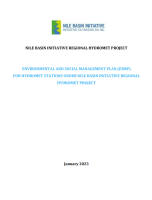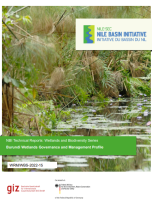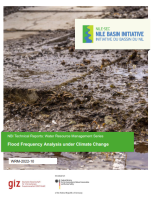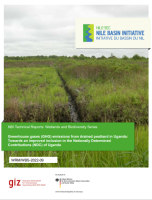Abstract
The Nile Basin Initiative (NBI) Secretariat (Nile-Sec) conducted a Strategic Water Resources Analysis (SWRA) in 2015 with the aim of developing sustainable options to meet the growing water needs of the Nile riparian countries, and subsequently to mitigate current and future water stress. Nile-Sec acknowledged that its previous SWRA study had gaps in the datasets, particularly a lack of integration of economic modeling of water use in terms of assessing the value of irrigation water. Another limitation of that first-phase assessment was that the impact of increased water productivity on food security and water utilization had not been analyzed across the Nile Basin (NB). It also had not analyzed the impact of optimal planning of cropping patterns on specific climate and soil conditions. Therefore, this second-phase study was tasked with refining the current estimates and projections of agricultural water demand/use. The outputs of this study will contribute to sustainable and efficient investment planning to meet growing water demands commensurate with the Nile-Sec plans. It is envisaged that options for water savings in agriculture, such as adoption of improved irrigation technologies, optimization of cropping patterns across the basin and other measures, could result in substantial gains across the NB. The phase II study has six components. This report pertains to component II of the project, which focuses on developing alternative future irrigation projection scenarios, which contribute to improving the baseline irrigation water demand and actual use in the basin. Several studies and datasets were reviewed and analyzed as inputs for this scenario development.A review of policy and strategy documents, master plans and programs indicates that almost all upper riparian countries of the NB want to expand irrigation to enhance food security and foster economic growth and transformation. Egypt’s policy is focused on improving productivity and water-use efficiency rather than expansion of irrigated land. Sudan on the other hand shows renewed interest in irrigation expansion due mainly to the loss of oil revenue as a result of the secession of South Sudan in 2011 and recognizing the recent positive advances of liberalization and income generation activity brought to Sudan. It should be noted that all countries except Burundi and the Democratic Republic of the Congo (DRC) have submitted their future irrigation development plans to the NBI. However, the planned irrigation schemes shown in the respective master plans and documents of these countries are different from what were submitted to the NBI and verified thereafter. The basis of scenario development for this study is the NBI-validated data and the baseline existing irrigation data compiled under this project of Technical Report I.




